
(Interview)

From Aural Innovations #8 (October 1999)
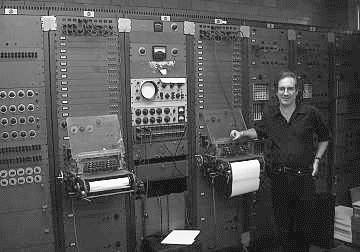
In the history of electronic rock music, few individuals have had as diverse a career as Larry Fast, who released recordings starting in 1975 under the Synergy monicker. Not only is Fast a noted electronic musician, but he has been active as a session and touring musician for such luminaries as Nektar and Peter Gabriel, a technical developer and consultant, and producer.
The first Synergy re-release, Electronic Realizations for Rock Orchestra went into distribution in 1995, twenty years after its original release. The second re-release, Sequencer was reissued late in 1996 followed by Cords in 1997. During 1998 manufacturing and distribution was licensed to Universal/PolyGram's Chronicles label and all nine of the original Synergy albums were reissued through Chronicles during 1998. Aural Innovations talked to Larry one evening during a break in his current hectic production schedule.
AI: Tell me how you got into electronic music. Were you a tech-head kid who just happened to dig rock 'n roll?
LF: You hit it right on the head. Well, it wasn't only rock 'n roll. It started out with classical and then kind of emerged as a rock 'n roll obsession later. But it was a melding of music and electronics where I was one of those kids that was wiring things up and building radios and learning the rudiments of electronic design even in grade school. And the one place those two things converge is electronic music. You couldn't have a better amalgam of the two.
AI: You build a lot of your equipment yourself?
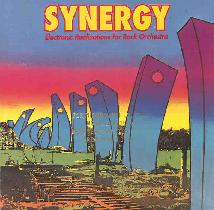 LF: Initially I did... really out of necessity. When I first started becoming serious about trying to use technology to create the music arts it was the time when the Moog synthesizer was just beginning to emerge from its really primitive state. Not that it was technically primitive, but the way that the synthesizer emerged was that individual modules that Robert Moog and the Moog company were making eventually reached a critical mass and then there was this sort of boxful of
modules, and then I guess a little later were things prepackaged like the Mini-Moog. But when those modules were coming out I was still in high school and I could not afford those. But I did have enough electronics knowledge to be dangerous, and was able to build equivalent types of things to some degree. And so I started out building things simply because I couldn't afford to do it any other way. It was much cheaper to go out and purchase a fistful of the appropirate parts rather than the completed goods from somewhere else. And that actually put me in pretty good stead because even later when I was in a position to be buying instruments from Moog, and from Oberheim, and some of the other earlier names when they were getting going, I still continued either to modify particular modules or build up ones that were special purpose that were doing functions that I wanted on my own. So it's something that's always stayed with me and then not too much longer after that when the micro computer era started I jumped into that with both feet too and was doing an awful lot of coding and trying to make small computers run musical instruments early on.
LF: Initially I did... really out of necessity. When I first started becoming serious about trying to use technology to create the music arts it was the time when the Moog synthesizer was just beginning to emerge from its really primitive state. Not that it was technically primitive, but the way that the synthesizer emerged was that individual modules that Robert Moog and the Moog company were making eventually reached a critical mass and then there was this sort of boxful of
modules, and then I guess a little later were things prepackaged like the Mini-Moog. But when those modules were coming out I was still in high school and I could not afford those. But I did have enough electronics knowledge to be dangerous, and was able to build equivalent types of things to some degree. And so I started out building things simply because I couldn't afford to do it any other way. It was much cheaper to go out and purchase a fistful of the appropirate parts rather than the completed goods from somewhere else. And that actually put me in pretty good stead because even later when I was in a position to be buying instruments from Moog, and from Oberheim, and some of the other earlier names when they were getting going, I still continued either to modify particular modules or build up ones that were special purpose that were doing functions that I wanted on my own. So it's something that's always stayed with me and then not too much longer after that when the micro computer era started I jumped into that with both feet too and was doing an awful lot of coding and trying to make small computers run musical instruments early on.
AI: When you say 'coding' you mean you were doing programming?
LF: Doing programming, but at the level of those little early primitive machines, it was all at machine code level so it was definitely programming but at such a primitive level that back then most of us called ourselves more coders than programmers.
AI: Would you say that the first Synergy albums were just as much about the technology as the music?
LF: They were maybe a statement about the technology because there were other things being done in electronic music and some of it was very good and a lot of it was very very bad. And I think if anything it was a musical statement saying that the people who were criticizing the use of electronics in music and saying it's a bad thing... I was trying to prove a point to those people that it's not the instruments, it's really in the hands of the musician, the composer, the producer, the creative operator. That's where the instruments, which themselves are fairly neutral, either become a thing of sonic beauty or sonic ugliness or whatever, but they are just tools. And I was seeing too many unknowledgeable blanket statements that technology is a bad thing and it will never make good art. And I just didn't buy that.
AI: So you had a composer burning inside you just as much.
LF: Yeah. But a composer with a desire to work through the technology. Because those were the two things that I wanted to bring together into one creative art form.
AI: So was each subsequent Synergy album to a degree considered a technological advance as well? Perhaps a chance to experiment with new toys within the context of the musical project?
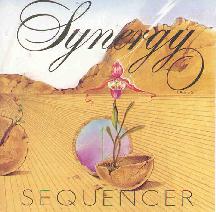 LF: You're absolutely right. And I was very fortunate in that my career was paralleling some fairly substantial advances in what was available in the equipment, both the synthesis equipment and the recording equipment. So if you look back at the first album it was 16-track analog with a bunch of analog modules. I think maybe we had one digital delay line and that was about it. Everything was the old style mechanical echos and echos chambers and tape delays. And then by the last of that first series of Synergy albums, the "Metropolitan Suite" album, it was recorded 24-track digital. It had been all pre-produced using Midi digital synthesis. It was quite a revolution in the techniques and how things could get done. But I think the interesting thing was that it didn't end up sounding that much different. The acoustic vision that I was going for, what I wanted out of the recording, stayed fairly consistent. It's just the way that I got to that end result changed over the years.
LF: You're absolutely right. And I was very fortunate in that my career was paralleling some fairly substantial advances in what was available in the equipment, both the synthesis equipment and the recording equipment. So if you look back at the first album it was 16-track analog with a bunch of analog modules. I think maybe we had one digital delay line and that was about it. Everything was the old style mechanical echos and echos chambers and tape delays. And then by the last of that first series of Synergy albums, the "Metropolitan Suite" album, it was recorded 24-track digital. It had been all pre-produced using Midi digital synthesis. It was quite a revolution in the techniques and how things could get done. But I think the interesting thing was that it didn't end up sounding that much different. The acoustic vision that I was going for, what I wanted out of the recording, stayed fairly consistent. It's just the way that I got to that end result changed over the years.
AI: "Metropolitan Suite". Is that the most recent of them all?
LF: It's the most recent. I've done a lot of other recording on some film scores, and working on other people's records and productions, but that capped off the nine albums that made up that Synergy series. And I'm expecting to have some new things by next year. But it's really become the beginning of a chapter two, or whatever you want to call that.
AI: Is the Synergy reissue series the first of this music since the albums first came out?
LF: Well there were CD's that came out in the late 80's. The original record company was Passport Records, which was part of the Jem Records group. They had gotten most of the records out, not all of them, but most of the LP's had been digitized and came out as CD's. They were good for the time period, but the audio technology actually got quite a bit better so these reissues are new digitally remastered versions of the old mixes. So they sound a lot better. If somebody bought the CD's that came out in 1986 or whatever, they really don't hold a candle to the versions that are out now. But except for a handful of them this is not the first time they've been out on CD.
AI: I was reading about your "watermarking". How is the watermark detectable, for example, if I've got a CD by someone who sampled your work?
LF: Well right now it's still a system that's playing a little bit of chicken and egg because the watermarking, just to take it back to a really basic level, watermarking is a way of weaving information into the audio. It can be anything. In this case it's a series of numbers that correspond to an internationally recognized song registry code. And that's something that's actually been part of the CD specification since the first CD's came out in the early 1980's. But nobody's really made much use of it and there really wasn't much use for it before. Now there are a whole host of uses for that. So one of the things, like you suggested, somebody sampled something without permission off of a record, and you want to be able to prove irrefutably that you're the owner... watermarking, using a decoder, they're not that complex but they're not in wide circulation yet, but they can be something as simple as a rather small piece of software that runs on a laptop that has audio input. And what would happen is then you would play the audio into that laptop running the software and it will, in the case of my recordings, put out what that registry code is, this ISRC code. And that code is managed by... well in my case the publishing rights organization that I work with is ASCAP. And they have that kind of information on file. But this is very early in the process. This is something where we're looking at a future where a piece of music is not bonded to a piece of plastic anymore. Where music can be floating in cyberspace either free, or for pay, or whatever. And the main point is that since there's not plastic or a paper label associated with the music, we need to label it somehow so that at its most simple level you'd be able to tell who was the artist, and what was the name of that song if it's some unassociated file. In its more complex nature, and I've got some mixed feelings about that, it can be used as an element of an anti-piracy system. But it's a long way from that working and I'm not sure that the anti-piracy will ever be a completely viable thing. But I think just in terms of for composers and musicians it's preparing for a future where there is no medium. Where music and performance are just bits floating around in cyberspace.
AI: I know mp3's (sound files) are very popular on the internet now. Would this include those?
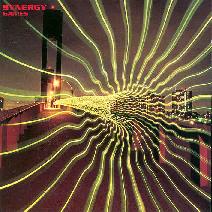 LF: Well the watermarks are kind of neutral. Here's sort of a positive and a negative example of how it would fit in. Let's say that I have recorded a track on my new record and I put it up for free distribution through mp3.com [internet web site for band sound files] or some other site on the web. People are free to distribute it and nobody's charging for ownership, but if it gets grabbed and used to be the theme song on a web radio program, or it gets used by somebody who picks it up off the web and uses it for the NBC television network or something... I'm entitled to get paid for that. But the way that it works now is that these organizations like ASCAP, they have to track things. And before the internet it was easier to keep track of a handful a radio stations and TV networks, and you could kind of tell who was using what fairly easily. Believe me, it was far from perfect. But it was at least somewhat managable. But now that there are tens of thousands of web radio stations and all kinds of other free distribution, unless they can automate the process of figuring out who's getting played on the air or on the web, how are they going to figure out how the composer is supposed to get paid out of the pool of money that they collect for those kinds of performances. So this allows them to automate it. It's very simple. I put the code in, they're notified that I own the song, I'm the creator of the song, and if you turn it up somewhere then please acknowledge that. So that's sort of the good thing. It doesn't really affect mp3. People can do whatever they want. Now the other side of it would be that you could theoretically put things into watermarks that would work in conjuction with other parts of the hardware to prohibit copying, to allow one or two copies to be made and then no more copies to be made. There are a lot of solutions to the piracy, free trade, or ripping off of CD's that are possible using a lot of different technology along with something like watermarking. So that might not be such a positive thing for people that want to just be able to freely copy the music they have. And I have a feeling there are probably going to be hacker solutions that are going to work around anything that tries to put that in place anyway. But I think in the legitimate use of just an extension of the same thing that's been done with radio and televison going back, in the case of 70, getting pretty close to 80 years of performers being played on the air and then being paid through ASCAP and BMI... this is something that goes on around the world, the watermark is just a way so that these things that have gone on getting close to a century now, and are a well defined way of people being compensated for their creative work, can work well into the 21st century.
LF: Well the watermarks are kind of neutral. Here's sort of a positive and a negative example of how it would fit in. Let's say that I have recorded a track on my new record and I put it up for free distribution through mp3.com [internet web site for band sound files] or some other site on the web. People are free to distribute it and nobody's charging for ownership, but if it gets grabbed and used to be the theme song on a web radio program, or it gets used by somebody who picks it up off the web and uses it for the NBC television network or something... I'm entitled to get paid for that. But the way that it works now is that these organizations like ASCAP, they have to track things. And before the internet it was easier to keep track of a handful a radio stations and TV networks, and you could kind of tell who was using what fairly easily. Believe me, it was far from perfect. But it was at least somewhat managable. But now that there are tens of thousands of web radio stations and all kinds of other free distribution, unless they can automate the process of figuring out who's getting played on the air or on the web, how are they going to figure out how the composer is supposed to get paid out of the pool of money that they collect for those kinds of performances. So this allows them to automate it. It's very simple. I put the code in, they're notified that I own the song, I'm the creator of the song, and if you turn it up somewhere then please acknowledge that. So that's sort of the good thing. It doesn't really affect mp3. People can do whatever they want. Now the other side of it would be that you could theoretically put things into watermarks that would work in conjuction with other parts of the hardware to prohibit copying, to allow one or two copies to be made and then no more copies to be made. There are a lot of solutions to the piracy, free trade, or ripping off of CD's that are possible using a lot of different technology along with something like watermarking. So that might not be such a positive thing for people that want to just be able to freely copy the music they have. And I have a feeling there are probably going to be hacker solutions that are going to work around anything that tries to put that in place anyway. But I think in the legitimate use of just an extension of the same thing that's been done with radio and televison going back, in the case of 70, getting pretty close to 80 years of performers being played on the air and then being paid through ASCAP and BMI... this is something that goes on around the world, the watermark is just a way so that these things that have gone on getting close to a century now, and are a well defined way of people being compensated for their creative work, can work well into the 21st century.
AI: Well it will be interesting to see how this develops, especially with music being available on the internet in all kinds of sound file formats.
LF: Sure. It's very possible that in the future... this is one possible future, I don't think this is my absolute prediction... but it's possible that in the future that music won't be sold the way you go to music stores and buy a disc and pay cash for that disc, and then you have one copy of that disc. It might be the kind of thing where it's really all given away and the consumer doesn't really pay for it, but the person who has the web site where you're getting it from who is selling banner advertising, they pay into the pool and distribute it by performing rights organizations. This is kind of the back room stuff of the music industry. It's always been going on but many people are not aware of it unless they're actually involved in the music industry. And you need some kind of a technological solution to make this feasible. And I think that the watermarking is an absolute necessity in some kind of automated music future. And the other part of it was that I wasn't about to use or sign on with a watermark that in any way affected the fidelity of the sonic purity of the music. And the one I've been working with is just impeccible. I cannot hear a thing, I can't detect a thing audibly. But it's absolutely there with the decoder. Other people have thought so much of it, other technical working groups, that its also recently become the accepted standard for the DVD audio, which is very much an audio file format well beyond regular CD sound... as well as a whole bunch of other organizations that are using it for web audio and a few other things. So I think it's got a real future as providing a kind of technological business solution. And it's important in the industry. Otherwise if everybody is giving away their music eventually nobody is going to be making money and musicians will be too poor to afford all the cool instruments and computers.
AI: I've been reading about your work as a consultant, and I think I even read about you being an actual developer involved with the Polymoog and projects at Bell labs. Tell me about that.
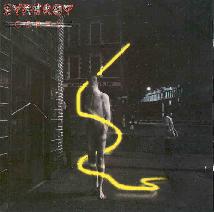 LF: Well those are all different little short projects owing to the fact that I had been doing a lot of my own technical and engineering development on my own records. It's not a terribly huge community of people who have been doing laboratory based creative work. So I always had a good working relationship with the Moog company and Robert Moog in particular. And they were always looking to have people that were out in the trenches with their instruments give them feedback, and help them out with concepts and ideas for their new instruments. The way I typically worked with them and the Polymoog and the Memory Moog and a few others that I was asked my advice on, was that the people in the company... the inhouse engineers and the inhouse developers doing the lions share of the work... there's no way that I should take credit for anything major on those instruments... but they would make early prototypes available to me and a handful of other people and solicit our feedback, and then I would often have maybe a little more specific engineering ideas since I was doing a little bit more of my own building. But the case of the Memory Moog went a little beyond that where I was asked to voice a number of the factory sounds that were shipped with the instrument. So when people got it home they didn't have to go learn programming, they could push a few buttons and get some cool sounds. Which is a fairly typical thing now in instruments, but it was relatively new back then. There were only a handful of programable instruments available.
LF: Well those are all different little short projects owing to the fact that I had been doing a lot of my own technical and engineering development on my own records. It's not a terribly huge community of people who have been doing laboratory based creative work. So I always had a good working relationship with the Moog company and Robert Moog in particular. And they were always looking to have people that were out in the trenches with their instruments give them feedback, and help them out with concepts and ideas for their new instruments. The way I typically worked with them and the Polymoog and the Memory Moog and a few others that I was asked my advice on, was that the people in the company... the inhouse engineers and the inhouse developers doing the lions share of the work... there's no way that I should take credit for anything major on those instruments... but they would make early prototypes available to me and a handful of other people and solicit our feedback, and then I would often have maybe a little more specific engineering ideas since I was doing a little bit more of my own building. But the case of the Memory Moog went a little beyond that where I was asked to voice a number of the factory sounds that were shipped with the instrument. So when people got it home they didn't have to go learn programming, they could push a few buttons and get some cool sounds. Which is a fairly typical thing now in instruments, but it was relatively new back then. There were only a handful of programable instruments available.
AI: It sounds like you started out as a beta tester but got involved a little bit from a development standpoint.
LF: Yeah, maybe a little closer to alpha. They had nine concepts together and they had working prototypes, but they went through some pretty severe changes. The Polymoog that I still have... it's not functioning anymore, but I still keep it around for sentimental value... it's radically different than the product that eventually shipped. Completely different circuit boards. Whole different layout of components inside. So it went through some big changes, although functionally and sonically it ended up kind of in the same place. It was a pretty good instrument. And the Bell labs things were just I lived in an area not far from the Murray Hill facility, which is one of the legendary sites for anybody who's been involved in engineering design, communications and audio. Many things happened at that location. Actually the first project was something that Bob Moog had recommended because he was too far away being in upstate New York. They had a project on digital synthesis, speech, and recording. And I kind of tagged along. I was kind of new to that end of the field. This goes back nearly 25 years at this point. And I was invited back to a couple of other individual short term projects that were pure research projects. It was the big Ma Bell phone company, and they were free at the laboratories to be exploring some areas that weren't directly related to telephones but might some day spin off some technologies that would be applicable to the phone system. It was a wonderful time, and for me it was a little bit like graduate school in mainframe computers and high-end acoustics. So it really helped. I think the thing that I found stunning was that back then I thought "gee, in a hundred years from now maybe people will actually have something like this in their homes". And now so many of us with home studios, digital recording to hard disc, and sonic manipulation, have it sitting on our desktops or even on our laptops now.
AI: And there's a lot of this stuff that's really affordable for people as well.
LF: It came so much more quickly than I ever anticipated.
AI: Shifting gears a bit. You have an interesting history of collaborations. Was Nektar the first of the bands that you were involved with?
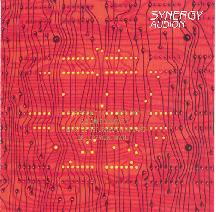 LF: It was. It's funny, I've kind of had this backward career model to what happens with a lot of people. They get in a band, the band gets famous, and then they spin off and do solo projects. And I was just doing solo things. And in the course of doing that, Nektar was distributed by the same label and we were introduced by the powers that be at the record company, and hit it off right away. I'm very flattered but they really liked what I was doing in electronic music, and they said we'd like to incorporate that into our own music. And they invited me to become part of the production group on their next record which was the "Recycled" album.
LF: It was. It's funny, I've kind of had this backward career model to what happens with a lot of people. They get in a band, the band gets famous, and then they spin off and do solo projects. And I was just doing solo things. And in the course of doing that, Nektar was distributed by the same label and we were introduced by the powers that be at the record company, and hit it off right away. I'm very flattered but they really liked what I was doing in electronic music, and they said we'd like to incorporate that into our own music. And they invited me to become part of the production group on their next record which was the "Recycled" album.
AI: Did you perform with them at all?
LF: Yes I did. I kind of did so much on the record they really couldn't perform it without me. And they knew that, and I knew that, and they said would you come out on the road. And the whole thing ran I guess about 18 months to two years of the album and touring, and actually having a lot of fun doing it.
AI: What was it about the Peter Gabriel collaboration that made it last so long? I think you worked with him for ten years?
LF: It was about ten years. It was a really good situation that I enjoyed. It was the kind of thing where Peter would be busy being creative some of the time on his own doing other, even non-musical projects, as he still does, or does even more so now. Which left me enough time to continue making Synergy records. And yet, at the same time, Synergy wasn't really something I could take out on tour. And I've never been that comfortable being the frontman of an organization. So I got to be part of one of... I think one of the most fun working bands out there which was Peter's live band... taking his records out on the road, and also working in the studio with him on a number of the records. So it really was an ideal situation. And as long as I had something to contribute Peter... well Peter left Genesis because he really didn't want a static band situation anymore. He was tired of that. And as long as what we were doing in the live band and the studio band with him met what he was looking to do then it worked fine. But when Peter, as he very often has done in his career, decided to change directions and move into more indigenous and ethnic music, and explore other areas than the kind of electronic sonic textures that I was bringing to the process I didn't have nearly as much to contribute. So there just really wasn't a place for me in the organization anymore. But it was all very amicable. And I think ten years was actually a fairly long time for Peter to stay in one place.
AI: Any preferences in terms of doing solo works versus participating as a band member? Do they each just have their own rewards and challenges?
LF: They each have their own rewards and you can get tired, or at least I can get tired of any of them if it goes on too long. And the nice thing with knowing that if we were out on the road with the Gabriel band for a number of months, knowing that this is going to end, and then I'll be back at home, and I won't have to answer to anybody, and I won't have to get up and catch a plane tomorrow. And then that would go on for a while, then I would get a little bored thinking "gee, it sure would be nice to be in the studio working with other people", and that would happen. And it would be "gee, it sure would be nice to be travelling again", and then that would happen. So for a decade that was pretty good.
AI: That must be the nice thing about having numerous projects. It's easy to move on from one.
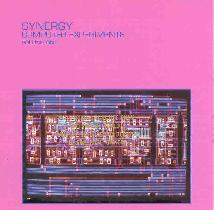 LF: It is. You have to be disciplined enough to maintain a work ethic where you're going to do your best work even when you're starting to get to that point where you're going, "gee I wish this would end". So I always try to maintain the level of enthusiasm to get the job done right, do my best work, and then knowing you're going to move on.
LF: It is. You have to be disciplined enough to maintain a work ethic where you're going to do your best work even when you're starting to get to that point where you're going, "gee I wish this would end". So I always try to maintain the level of enthusiasm to get the job done right, do my best work, and then knowing you're going to move on.
AI: I wanted to ask you about NEARFest. I thought it was very interesting that the organizers brought you in not as a performer but to give a presentation.
LF: Well that was my doing actually. They wanted me to play a set and it was... well I don't really have a live act. Especially since not being on the road with Peter it's really been more of a studio oriented composers kind of thing. I've done a handful of live performances but the last thing was last year... actually it was almost two years now with Wendy Carlos' ensemble doing Switch On Bach live. Even that was a different kind of performance. It was a classical performance. It was very electronic. But that took an enormous amount of preparation, and eight people to pull off. And for NearFEST there really wasn't anything that I had in the Synergy mode that I could really do for them. So I said, look I want to be involved. I'll come, I'll hang out, and... I don't remember who suggested it, I think it was probably me, but I said, look I could even give you a little talk, or between sets while the roadies are working I can stand there and take a bunch of questions and answers from people. And they said, well why don't you turn it into something a little bit more than that. And so I did.
AI: Do you keep up with the bands that are active these days, perhaps even the bands that performed at NEARFest?
LF: I was familiar with some of the names but... one of the things that I did find happening to myself going back to when I first started making music and playing with other people was that the more involved I was in creating music, the less time I actually had to listen to other music. Cause I was very obsessive about music like 35 years ago. Y'know, I knew every band that was coming out and I knew every album. I tried to buy every album for quite a while. And to realize that I've just kind of unplugged from that mindset. I mean I stuck around NearFEST and I heard a bunch of the bands play. But it was the first time of hearing most of them.
AI: You had mentioned doing soundtrack work earlier. Of your nine Synergy releases the soundtrack to "The Jupiter Menace" is one. Are there others worthy of note?
LF: Well there's a lot of stuff that I've done that has been lower key and hasn't had soundtrack albums out. That's a large part of what was going on during the 90's. There's been things for HBO films. Some smaller film companies. I was the music producer on an independent film about a year and a half ago where I actually didn't play anything but I was in charge of all the music on it. There's been a number of these smaller lower key things. And each one of them is about as much work as doing an album. But I'm at a little bit of a disadvantage because I'm East coast-based near the New York area. And if I want to throw my hat completely into the film scoring ring I really gotta move to L.A. And if I were to do that I'd really be giving up everything else. A lot of the connection to the technology community, and the audio community, and the other elements of the arts community in the New York area that I find a lot more rewarding to my life that I don't want to give up. So right now I'm just sort of toughing it out with the smaller films. And now that a lot of the dust has settled after my former record company had gone out of business and the albums are all back out I can throw myself a little bit more back into the Synergy recordings. And that's exactly what I'm in the midst of working on right now.
AI: So we can expect that there will be some new Synergy releases in the near future?
LF: Probably not in the near near future. 1998 was really completely tied up with getting the older catalog remastered, and the new artwork... it looks like the original artwork but it's actually reconstituted for the CD's, and all new prints, and it turned out to be a lot of work. Just getting all that organized and getting it done and getting all the releases was far more time consuming than I ever thought it would be. So it ate up most of the year. And then when 1999 rolled around and I got the last of those old releases out of the way I said I'm going to jump into the new recordings. And of course I still ended up having other projects, other people to work with. So I haven't gotten as far along on it as I would hope, but I have been pursuing two parallel paths. One is a project of electronic transcriptions of certain classical pieces that I wanted to attend. The first one is partly done now. It's Ravel's Pavane and it's actually appearing on an album for Kosovo refugees. It will be out sometime I understand about the end of September. In addition to that I ended up mastering the project as well with another one of my hats as a studio mastering engineer.
AI: You're working on a couple of production projects simultaneously right now?
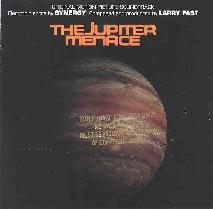 LF: Another one is with Annie Haslam [from Renaissance] who I've worked with a number of times over the years. And we're writing several songs for her new album. Another project... I'm not really at liberty to say... but it's a big high profile rock 'n roll band where I'm just doing sonic pallette work with people in the band. I'm not really playing as much with creating sounds to be used on the record.
LF: Another one is with Annie Haslam [from Renaissance] who I've worked with a number of times over the years. And we're writing several songs for her new album. Another project... I'm not really at liberty to say... but it's a big high profile rock 'n roll band where I'm just doing sonic pallette work with people in the band. I'm not really playing as much with creating sounds to be used on the record.
AI: I'm curious, on your first CD's you boast "no guitars" and then we get to "Cords" and it's "finally guitars", and then I think after "Cords" it was no guitars again. What was there about "Cords"? Was it just an experiment?
LF: Well the guitars on "Cords" is really guitar synthesis so there's no guitars per se. There's a guitar controller controlling the Moog. And that was an old friend of mine Pete Sobel who had been a guitarist in a band I'd been in years before who's another good technologist and a great player. But that whole thing - "and nobody played guitar" - was something that Marty Scott, who was the president of Passport Records, really wanted to put on the first Synergy album because it was an answer to a statement on the first Queen album which said "and nobody played synthesizers". They made a big deal about that, that there were no synthesizers on the record. I think on the first one we used the exact phrasing from the Queen album. And on "Cords" it was "finally guitars... sort of". And that was because, yes this thing had six strings but you never hear those steel strings anywhere on the record. It's always using that to control the oscillators. And it was kind of an experiment and I thought it worked very well.
AI: I can't resist asking if you were ever much into early bands like Tangerine Dream, Ash Ra Tempel, or maybe even Hawkwind?
LF: Not that much to be honest. Tangerine Dream I was keeping an eye on because we were doing things around the same time. I was already in the studio doing some stuff with Yes, building Rick Wakeman some custom modules. So even prior to the Synergy albums in the mid-70's I was involved in the scene of the mellotron and synthesizer world in the UK going back to 1971 or thereabouts on a professional level. So something like Tangerine Dream which was sort of contemporary with that, I was intrigued by what they were doing. But I was drawn more to... in the pure electronic world... stuff that Wendy Carlos was doing. And I'm very pleased to say that Wendy, who I didn't know at the time, I really admired the recordings from "Switched On Bach", and "Clockwork Orange" out. I thought they were really so much above what anybody was doing in either the progressive, or spacerock, or whatever you wanted to call that world that I was operating in myself. And I thought this is the mark to hit. And now to have worked closely with Wendy over the last twenty years or so, and to be a member of her live performance ensemble. And in a sense, although we've become very good friends, for me it's also an on-going master class in electronic production, musicology, mixing, a lot of things that are involved in that. That was more where I was gravitating to. And I think earlier when we were talking I said there was some very good electronic music done in this early era, and Wendy's stuff predates a lot of this... well the earliest parts of her career are about 1961. And then the big public consciousness started around 1967. And then a lot of the bands were a bit later after that. But there were a lot of really bad copy recordings of Wendy's work, the Switched On type of thing. I thought they were just awful. I thought many of them had no sensitivity to what the medium was. And I kind of just stirred in the edges of things like Hawkwind and Amon Düül. I was certainly aware of them and I would listen to the records and I thought... very good, very interesting, but not where I want to go.
AI: It sounds like you strive to continue to be a student as well.
LF: I think it's always a learning process. It's interesting cause just today I was in New York at the Columbia University electronic music center, which in a previous incarnation was the Columbia-Princeton electronic music labs. And it was the first time that I'd been up there, but this is the place where Wendy Carlos went to graduate school and where Robert Moog worked on the equipment in the 1950's and 60's. And today for the first time I saw the RCA Mark II synthesizer, which is this room-sized vacuum tube powered beast of a synthesizer with a mechanical sequencer with a thing that looks like a bicycle chain on it. And I can't even say this is exactly where it all began, but this was a launching point for everything that's come since then. It was a real landmark in the way of creating music through technology. And it was really nice to see that there's a respect for the historical aspect of this at the university. And the people that are running it now are dedicated to moving the place forward, but also not trying to pretend that the past didn't happen and I think that's real important.
AI: Have you moved from being a coder, to use your term, to actually doing programming?
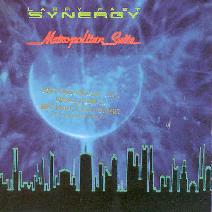 LF: Well not as much. The thing that happened was that as the middle 80's wore on a lot of the things that I was doing like writing my own sequencers, and Midi control operations where I was doing different transforms on Midi... it got to be so time consuming, and commericial products are starting to appear, that it got to the point where I could either just become another programmer, or I could keep trying to follow my own muse and create music art that was unique to me. So at this point I do like still to get under the hood at some level with the instruments, or even with the software and customize it to some degree but not to the point of hacking it apart just to view what's in it. And I find myself using the same commercially available software that anybody's got access to for the most part. Sometimes I'm fortunate cause I will get earlier alpha or beta copies, or I will get some people that are experimenting in writing some new software that might never make it to commercial distribution. I'll have access to some of that. I certainly know enough about programming that if I have an overriding need to generate software to run on the computer to do a specific task and I just simply couldn't find it anywhere else I guess I would tackle it myself.
LF: Well not as much. The thing that happened was that as the middle 80's wore on a lot of the things that I was doing like writing my own sequencers, and Midi control operations where I was doing different transforms on Midi... it got to be so time consuming, and commericial products are starting to appear, that it got to the point where I could either just become another programmer, or I could keep trying to follow my own muse and create music art that was unique to me. So at this point I do like still to get under the hood at some level with the instruments, or even with the software and customize it to some degree but not to the point of hacking it apart just to view what's in it. And I find myself using the same commercially available software that anybody's got access to for the most part. Sometimes I'm fortunate cause I will get earlier alpha or beta copies, or I will get some people that are experimenting in writing some new software that might never make it to commercial distribution. I'll have access to some of that. I certainly know enough about programming that if I have an overriding need to generate software to run on the computer to do a specific task and I just simply couldn't find it anywhere else I guess I would tackle it myself.
AI: Any parting words?
LF: We talked about some classical pieces for one. More traditional, if you can use the word traditional, original Synergy sounding pieces for another. And I'm still casting around looking for a Computer Experiments Volume Two ambient type of algorithmic recording. My biggest problem at the moment is I don't want to just rehash Volume One, I want to do something a little more distinctive for a second one, even if it is twenty years later. And I just haven't found anything that was so distinctive in the computer algorithmic composing world yet. So maybe there'll be a third one of an ambient type of thing, but if not there'll be others coming down the line. But hopefully there'll be individual tracks from some of these things trickling out in the next couple of months and then maybe a complete CD's worth of material during the year 2000 sometime.
SYNERGY recordings on Third Contact are manufactured and distributed by Universal/PolyGram's Chronicles label. CDs can be bought through most record stores or a number of online sources. You can visit Larry Fast at his web site.
Synergy Discography:
Electronic Realizations For Rock Orchestra (1975)
Sequencer (1976)
Cords (1978)
Games (1979)
Audion (1981)
Computer Experiments: Volume One (1981)
The Jupiter Menace (1982)
Semi-Conductor: Release 2 (1984)
Metropolitan Suite (1987)